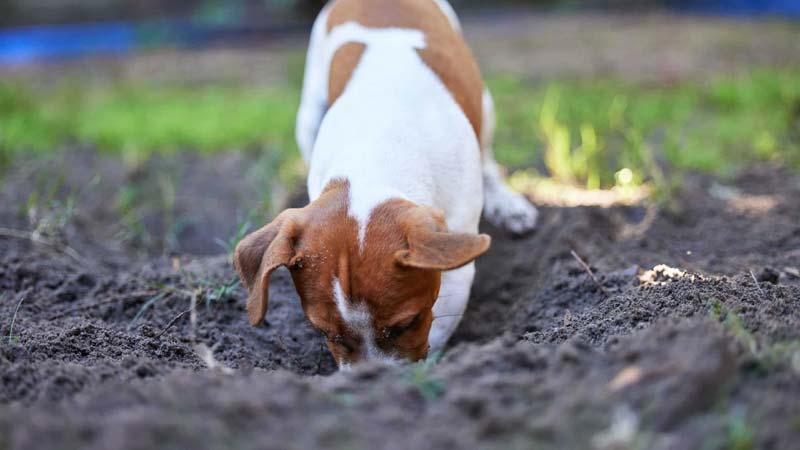- Size
- Smallest
- Small
- Small to Medium
- Medium
- Large
- Giant
- Characteristics
- Smartest
- Hypoallergenic
- Fluffy
- Best Guard
- Best Family
- Best for Kids
- Low Shedding
- Healthiest
- Police Dogs
- Most Calm
- Quietest
- Color
- White
- Black
- Grey
- Brown
- Blue
- Red
- Coat
- Hairless
- Short
- Long
- Origin
- Japan
- China
- Australia
- Germany
- Italy
- United States
- France
- Group
- Hound
- Terrier
- Herding
- Toy
- Working
- Sporting
The Reasons Behind Canine Digging and Effective Solutions

The sight of a dog enthusiastically digging up a yard might seem endearing at first, but for many pet owners, it swiftly turns into a vexing issue. Why do dogs dig? Understanding the motives behind this behavior is the first step towards addressing and redirecting it effectively.
Dogs, stemming from their ancestral roots, have an inherent inclination to dig. It's encoded in their DNA, rooted in survival instincts and specific breed histories. For instance, breeds like terriers, bred for hunting purposes, possess an inherent propensity to dig as part of their hunting strategies.
So, why does your furry companion dig up your yard? The reasons are as varied as the breeds themselves:
Here Are Some Reasons Why Dogs Love Digging
1. Boredom or Excess Energy
Dogs often resort to digging when they're bored or have pent-up energy. It's their way of releasing surplus energy and keeping themselves engaged.
2. Anxiety or Fear
Feelings of anxiety or fear can drive dogs to dig as a coping mechanism. Understanding and addressing their anxieties can alleviate this behavior.
3. Hunting Instinct
Embedded deep within their genes, the hunting instinct triggers the urge to dig, often in pursuit of something they believe is hidden beneath the ground.
4. Comfort-Seeking
Digging offers dogs a means of creating a comfortable spot for themselves, whether for nesting, cooling off, or seeking shelter.
5. Desire to Hide Possessions
A dog might dig to bury or retrieve possessions, such as bones or toys, akin to their wild ancestors' behavior of storing food.
6. Seeking Access or Escape
In some cases, dogs may dig to access a different area or to escape confinement, especially if they're feeling constrained or isolated.
How to Solution for Dog Digging Behavior
As a pet owner, it's essential to decipher the underlying cause behind your dog's digging habits. Once the root cause is identified, several strategies can help redirect this behavior:
Exercise and Quality Time
Increasing physical exercise and providing mental stimulation can significantly reduce a dog's propensity to dig out of boredom or excess energy. Engaging in activities and spending quality time together can channel their energy positively.
Behavioral Training
For dogs exhibiting anxiety or fear-driven digging, specialized training and behavioral support can be instrumental. Positive reinforcement techniques can help alleviate anxiety-induced behaviors.
Creating a Designated Digging Area
Establishing a dedicated space, like a sandbox, specifically for your dog to indulge in digging can work wonders. Introduce the concept to your pet and train them to understand that this area is acceptable for digging. Encouraging them and praising their digging in this zone helps reinforce this behavior.
Consistency and Patience
Consistency in training methods and patience are crucial. Rewarding positive behavior in the designated digging area and redirecting them gently if they dig elsewhere helps modify their conduct over time.
Conclusion
While these strategies often prove effective, every dog is unique. If the digging behavior persists or seems excessive, seeking guidance from a professional dog trainer or behaviorist is advisable. They can provide tailored solutions and support to address your dog's specific needs.
Understanding the reasons behind your dog's digging tendencies and employing targeted strategies not only helps preserve your yard but also strengthens the bond between you and your furry companion. By catering to their instincts in a controlled manner, you foster a harmonious environment for both your dog and your home.
You May Also Like
 Dog BehaviorUnderstanding Dog Chewing: Causes and Solutions
Dog BehaviorUnderstanding Dog Chewing: Causes and Solutions Dog BehaviorCommon Instigators of Excessive Dog Barking
Dog BehaviorCommon Instigators of Excessive Dog Barking Help & AdviceThe 6 Benefits of Chew Toys for Dogs
Help & AdviceThe 6 Benefits of Chew Toys for Dogs Help & AdviceHow To Keep Your Young Puppy From Eating Toys
Help & AdviceHow To Keep Your Young Puppy From Eating Toys Help & AdvicePawsitive Health Habits: A Guide to Keeping Your Dog in Top Shape
Help & AdvicePawsitive Health Habits: A Guide to Keeping Your Dog in Top Shape Useful AccessoriesThe Pros and Cons of Using a Halo Collar for Dog Training
Useful AccessoriesThe Pros and Cons of Using a Halo Collar for Dog Training